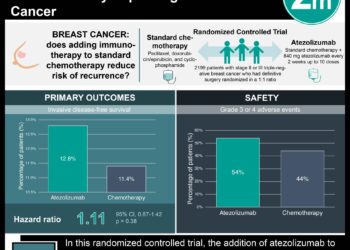Pembrolizumab and carboplatin plus docetaxel treatment regimens may provide options for patients with triple-negative breast cancer who are ineligible for anthracycline-based regimens
1. Overall pathologic complete response to treatment of triple-negative breast cancer with a non-anthracycline regimen was 58%
2. The estimated 3-year event-free survival for all patients was 86%
Evidence Rating Level: 2 (Good)
Study Rundown: The standard treatment of triple-negative breast cancer (TNBC) has primarily been a 5-drug combination, which includes anthracyclines and cyclophosphamide. While these medications have been effective, there are serious risks associated with their use, including cardiotoxicity. Since it has been observed in previous studies that regimens comprised of carboplatin plus taxane, this study explored a treatment regimen of carboplatin and docetaxel plus pembrolizumab in triple-negative breast cancer, without anthracyclines. The primary outcome of this study was the pathologic complete response rate (pCR). Secondary outcomes included residual cancer burden (RCB), event-free survival (EFS) and toxicity. The overall pCR rates were 58% while the RCB rate was 69%. The 3-year estimated EFS was 86% for all patients. EFS was higher in patients with pCR at 98%, while it was lower in patients with RCB at 68%. Almost a third of patients (26.9%) experienced moderate treatment-related adverse events (AEs) at grade 3 or higher, the most common of which was diarrhea, anemia, and peripheral sensory neuropathy (PSN). Immune-mediated AEs (iAEs) were about as common at 26.1% of all patients experiencing a grade 3 or higher iAE, with colitis being the most common. Limitations of this study include that its design was not to explore positive outcomes of immunotherapy with chemotherapy, and the lack of adjuvant pembrolizumab is not in keeping with standard practice guidelines at this time. Overall, the results from this study further the knowledge regarding the treatment of TNBC with therapy regimens that do not include anthracycline-based chemoimmunotherapy.
Click to read the study in JAMA Oncology
Relevant Reading: Neoadjuvant durvalumab improves survival in early triple-negative breast cancer independent of pathological complete response
In-Depth [prospective cohort]: This study was completed in the USA at two study centres, and was an open-label, phase 2, single-group study. The participants were 115 treatment-naïve adult females aged 70 years who were diagnosed with TNBC between stages I-III and had also not had breast surgery. There were 111 participants for whom data was assessed. The outcomes of interest were pCR, the overall rates of which were 58% (95% confidence interval (CI), 48-67%). RCB rate was 69% (95% CI, 60-78%). The results for patients with TNM stage II and III were similar at 58% and 69% respectively. Finally, patients were stratified into TNM stage I, II, and III and their pCR results were 69%, 58%, and 43%, respectively. The overall 3-year estimated EFS was 86% (95% CI, 77-95%), while it was 98% in patients with pCR (95% CI, 95-100%), and in patients with RCB, it was 68% (95% CI, 48-88%). The most common moderate AEs were diarrhea (4.3% of patients), anemia (3.5% of patients), and PSN (2.6% of patients). Colitis was the most common iAE for this study, with 1.7% of patients experiencing it. There was 1 death attributable to the study treatment.
Image: PD
©2023 2 Minute Medicine, Inc. All rights reserved. No works may be reproduced without expressed written consent from 2 Minute Medicine, Inc. Inquire about licensing here. No article should be construed as medical advice and is not intended as such by the authors or by 2 Minute Medicine, Inc.







